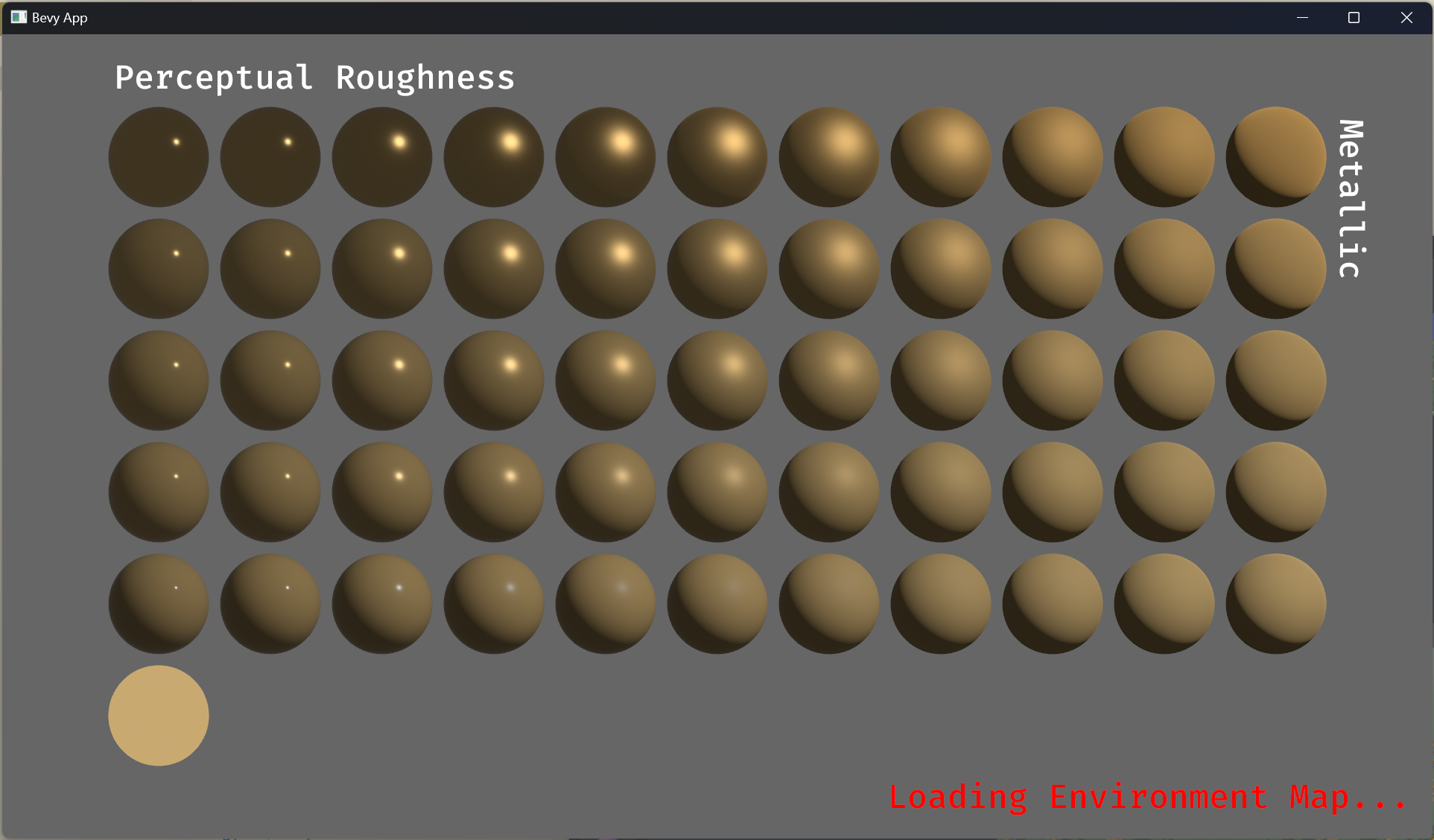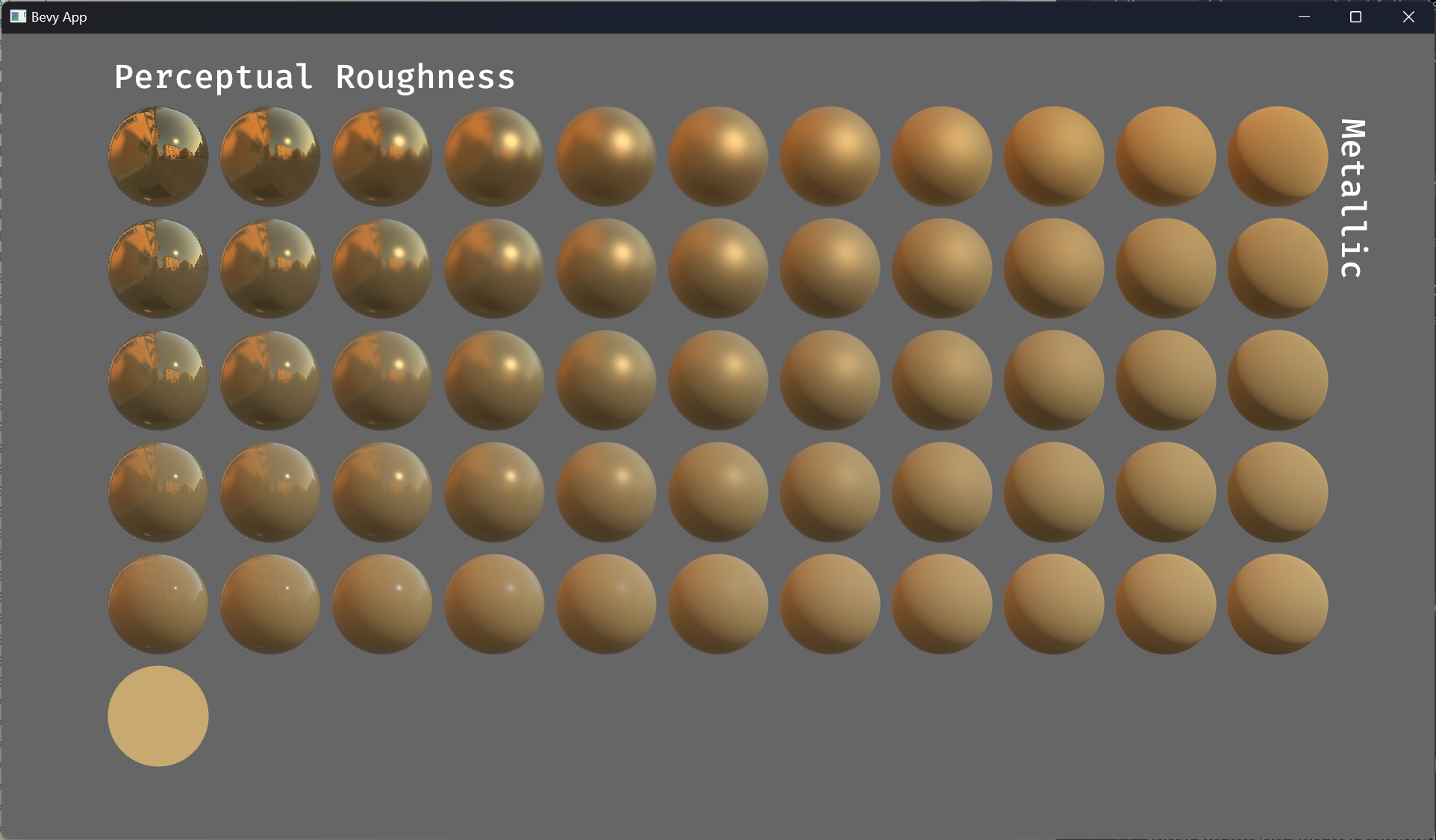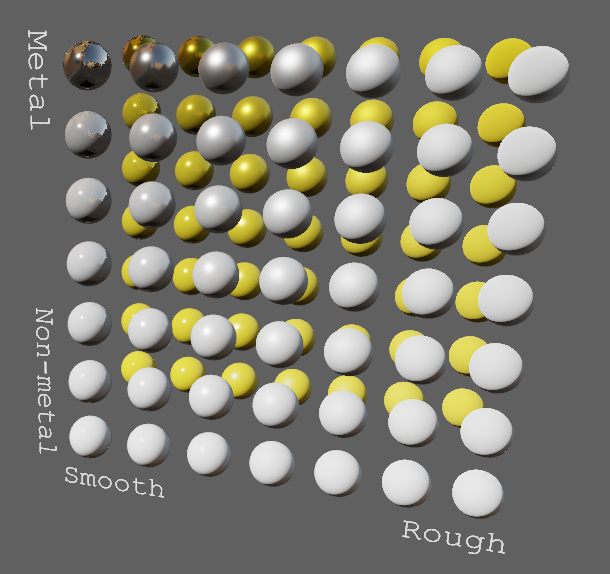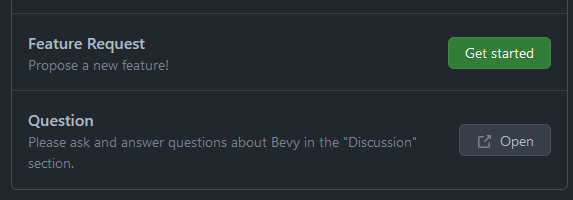# Objective
Closes#7821. A good chunk of performance related issues filed are tough
to take action on without much deeper investigation by the author, who
may or may not be responsive after filing the issue.
## Solution
Add a performance regression issue template and use it to direct users
to take a more proactive role in investigating the source of the
regression.
---------
Co-authored-by: Alice Cecile <alice.i.cecile@gmail.com>
Co-authored-by: François <mockersf@gmail.com>
Co-authored-by: Carter Anderson <mcanders1@gmail.com>
# Objective
- Test mobile example on real devices
## Solution
- Use [BrowserStack](https://www.browserstack.com) to have access to
[real
devices](https://www.browserstack.com/list-of-browsers-and-platforms/app_automate)
- [App Automate](https://www.browserstack.com/app-automate) to run the
example
- [App Percy](https://www.browserstack.com/app-percy) to compare the
screenshot
- Added a daily/manual CI job that will build for iOS and Android, send
the apps to BrowserStack, run the app on one iOS device and one Android
device, capture a screenshot, send it for visual validation, and archive
it in the GitHub action
Example run: https://github.com/mockersf/bevy/actions/runs/4521883534
They currently have a bug with the settings to view snapshots, they
should be public. I'll raise it to them, and if they don't fix it in
time it's possible to work around for everyone to view the results
through their API.
@cart to get this to work, you'll need
- to set up an account on BrowserStack
- add the secrets `BROWSERSTACK_USERNAME` and `BROWSERSTACK_ACCESS_KEY`
to the Bevy repo
- create a project in Percy
- add the secret `PERCY_TOKEN` to the Bevy repo and modify the project
name line 122 in the `Daily.yml` file
# Objective
- Fixes#1800, fixes#6984
- Alternative to #7196
- Ensure feature list is always up to date and that all are documented
- Help discovery of features
## Solution
- Use a template to update the cargo feature list
- Use the comment just above the feature declaration as the description
- Add the checks to CI
- Add the features to the base crate doc
# Objective
- Environment maps use these formats, and in the future rendering LUTs will need textures loaded by default in the engine
## Solution
- Make ktx2 and zstd part of the default feature
- Let examples assume these features are enabled
---
## Changelog
- `ktx2` and `zstd` are now party of bevy's default enabled features
## Migration Guide
- If you used the `ktx2` or `zstd` features, you no longer need to explicitly enable them, as they are now part of bevy's default enabled features
# Objective
We have a few old system labels that are now system sets but are still named or documented as labels. Documentation also generally mentioned system labels in some places.
## Solution
- Clean up naming and documentation regarding system sets
## Migration Guide
`PrepareAssetLabel` is now called `PrepareAssetSet`
(Before)

(After)


# Objective
- Improve lighting; especially reflections.
- Closes https://github.com/bevyengine/bevy/issues/4581.
## Solution
- Implement environment maps, providing better ambient light.
- Add microfacet multibounce approximation for specular highlights from Filament.
- Occlusion is no longer incorrectly applied to direct lighting. It now only applies to diffuse indirect light. Unsure if it's also supposed to apply to specular indirect light - the glTF specification just says "indirect light". In the case of ambient occlusion, for instance, that's usually only calculated as diffuse though. For now, I'm choosing to apply this just to indirect diffuse light, and not specular.
- Modified the PBR example to use an environment map, and have labels.
- Added `FallbackImageCubemap`.
## Implementation
- IBL technique references can be found in environment_map.wgsl.
- It's more accurate to use a LUT for the scale/bias. Filament has a good reference on generating this LUT. For now, I just used an analytic approximation.
- For now, environment maps must first be prefiltered outside of bevy using a 3rd party tool. See the `EnvironmentMap` documentation.
- Eventually, we should have our own prefiltering code, so that we can have dynamically changing environment maps, as well as let users drop in an HDR image and use asset preprocessing to create the needed textures using only bevy.
---
## Changelog
- Added an `EnvironmentMapLight` camera component that adds additional ambient light to a scene.
- StandardMaterials will now appear brighter and more saturated at high roughness, due to internal material changes. This is more physically correct.
- Fixed StandardMaterial occlusion being incorrectly applied to direct lighting.
- Added `FallbackImageCubemap`.
Co-authored-by: IceSentry <c.giguere42@gmail.com>
Co-authored-by: James Liu <contact@jamessliu.com>
Co-authored-by: Rob Parrett <robparrett@gmail.com>
# Objective
- In case of a CI failure before the MSRV check, like installing linux dependencies, a comment was still added to the PR
## Solution
- Check that the actual MSRV step failed
# Objective
- Merge the examples on iOS and Android
- Make sure they both work from the same code
## Solution
- don't create window when not in an active state (from #6830)
- exit on suspend on Android (from #6830)
- automatically enable dependency feature of bevy_audio on android so that it works out of the box
- don't inverse y position of touch events
- reuse the same example for both Android and iOS
Fixes#4616Fixes#4103Fixes#3648Fixes#3458Fixes#3249Fixes#86
Huge thanks to @maniwani, @devil-ira, @hymm, @cart, @superdump and @jakobhellermann for the help with this PR.
# Objective
- Followup #6587.
- Minimal integration for the Stageless Scheduling RFC: https://github.com/bevyengine/rfcs/pull/45
## Solution
- [x] Remove old scheduling module
- [x] Migrate new methods to no longer use extension methods
- [x] Fix compiler errors
- [x] Fix benchmarks
- [x] Fix examples
- [x] Fix docs
- [x] Fix tests
## Changelog
### Added
- a large number of methods on `App` to work with schedules ergonomically
- the `CoreSchedule` enum
- `App::add_extract_system` via the `RenderingAppExtension` trait extension method
- the private `prepare_view_uniforms` system now has a public system set for scheduling purposes, called `ViewSet::PrepareUniforms`
### Removed
- stages, and all code that mentions stages
- states have been dramatically simplified, and no longer use a stack
- `RunCriteriaLabel`
- `AsSystemLabel` trait
- `on_hierarchy_reports_enabled` run criteria (now just uses an ad hoc resource checking run condition)
- systems in `RenderSet/Stage::Extract` no longer warn when they do not read data from the main world
- `RunCriteriaLabel`
- `transform_propagate_system_set`: this was a nonstandard pattern that didn't actually provide enough control. The systems are already `pub`: the docs have been updated to ensure that the third-party usage is clear.
### Changed
- `System::default_labels` is now `System::default_system_sets`.
- `App::add_default_labels` is now `App::add_default_sets`
- `CoreStage` and `StartupStage` enums are now `CoreSet` and `StartupSet`
- `App::add_system_set` was renamed to `App::add_systems`
- The `StartupSchedule` label is now defined as part of the `CoreSchedules` enum
- `.label(SystemLabel)` is now referred to as `.in_set(SystemSet)`
- `SystemLabel` trait was replaced by `SystemSet`
- `SystemTypeIdLabel<T>` was replaced by `SystemSetType<T>`
- The `ReportHierarchyIssue` resource now has a public constructor (`new`), and implements `PartialEq`
- Fixed time steps now use a schedule (`CoreSchedule::FixedTimeStep`) rather than a run criteria.
- Adding rendering extraction systems now panics rather than silently failing if no subapp with the `RenderApp` label is found.
- the `calculate_bounds` system, with the `CalculateBounds` label, is now in `CoreSet::Update`, rather than in `CoreSet::PostUpdate` before commands are applied.
- `SceneSpawnerSystem` now runs under `CoreSet::Update`, rather than `CoreStage::PreUpdate.at_end()`.
- `bevy_pbr::add_clusters` is no longer an exclusive system
- the top level `bevy_ecs::schedule` module was replaced with `bevy_ecs::scheduling`
- `tick_global_task_pools_on_main_thread` is no longer run as an exclusive system. Instead, it has been replaced by `tick_global_task_pools`, which uses a `NonSend` resource to force running on the main thread.
## Migration Guide
- Calls to `.label(MyLabel)` should be replaced with `.in_set(MySet)`
- Stages have been removed. Replace these with system sets, and then add command flushes using the `apply_system_buffers` exclusive system where needed.
- The `CoreStage`, `StartupStage, `RenderStage` and `AssetStage` enums have been replaced with `CoreSet`, `StartupSet, `RenderSet` and `AssetSet`. The same scheduling guarantees have been preserved.
- Systems are no longer added to `CoreSet::Update` by default. Add systems manually if this behavior is needed, although you should consider adding your game logic systems to `CoreSchedule::FixedTimestep` instead for more reliable framerate-independent behavior.
- Similarly, startup systems are no longer part of `StartupSet::Startup` by default. In most cases, this won't matter to you.
- For example, `add_system_to_stage(CoreStage::PostUpdate, my_system)` should be replaced with
- `add_system(my_system.in_set(CoreSet::PostUpdate)`
- When testing systems or otherwise running them in a headless fashion, simply construct and run a schedule using `Schedule::new()` and `World::run_schedule` rather than constructing stages
- Run criteria have been renamed to run conditions. These can now be combined with each other and with states.
- Looping run criteria and state stacks have been removed. Use an exclusive system that runs a schedule if you need this level of control over system control flow.
- For app-level control flow over which schedules get run when (such as for rollback networking), create your own schedule and insert it under the `CoreSchedule::Outer` label.
- Fixed timesteps are now evaluated in a schedule, rather than controlled via run criteria. The `run_fixed_timestep` system runs this schedule between `CoreSet::First` and `CoreSet::PreUpdate` by default.
- Command flush points introduced by `AssetStage` have been removed. If you were relying on these, add them back manually.
- Adding extract systems is now typically done directly on the main app. Make sure the `RenderingAppExtension` trait is in scope, then call `app.add_extract_system(my_system)`.
- the `calculate_bounds` system, with the `CalculateBounds` label, is now in `CoreSet::Update`, rather than in `CoreSet::PostUpdate` before commands are applied. You may need to order your movement systems to occur before this system in order to avoid system order ambiguities in culling behavior.
- the `RenderLabel` `AppLabel` was renamed to `RenderApp` for clarity
- `App::add_state` now takes 0 arguments: the starting state is set based on the `Default` impl.
- Instead of creating `SystemSet` containers for systems that run in stages, simply use `.on_enter::<State::Variant>()` or its `on_exit` or `on_update` siblings.
- `SystemLabel` derives should be replaced with `SystemSet`. You will also need to add the `Debug`, `PartialEq`, `Eq`, and `Hash` traits to satisfy the new trait bounds.
- `with_run_criteria` has been renamed to `run_if`. Run criteria have been renamed to run conditions for clarity, and should now simply return a bool.
- States have been dramatically simplified: there is no longer a "state stack". To queue a transition to the next state, call `NextState::set`
## TODO
- [x] remove dead methods on App and World
- [x] add `App::add_system_to_schedule` and `App::add_systems_to_schedule`
- [x] avoid adding the default system set at inappropriate times
- [x] remove any accidental cycles in the default plugins schedule
- [x] migrate benchmarks
- [x] expose explicit labels for the built-in command flush points
- [x] migrate engine code
- [x] remove all mentions of stages from the docs
- [x] verify docs for States
- [x] fix uses of exclusive systems that use .end / .at_start / .before_commands
- [x] migrate RenderStage and AssetStage
- [x] migrate examples
- [x] ensure that transform propagation is exported in a sufficiently public way (the systems are already pub)
- [x] ensure that on_enter schedules are run at least once before the main app
- [x] re-enable opt-in to execution order ambiguities
- [x] revert change to `update_bounds` to ensure it runs in `PostUpdate`
- [x] test all examples
- [x] unbreak directional lights
- [x] unbreak shadows (see 3d_scene, 3d_shape, lighting, transparaency_3d examples)
- [x] game menu example shows loading screen and menu simultaneously
- [x] display settings menu is a blank screen
- [x] `without_winit` example panics
- [x] ensure all tests pass
- [x] SubApp doc test fails
- [x] runs_spawn_local tasks fails
- [x] [Fix panic_when_hierachy_cycle test hanging](https://github.com/alice-i-cecile/bevy/pull/120)
## Points of Difficulty and Controversy
**Reviewers, please give feedback on these and look closely**
1. Default sets, from the RFC, have been removed. These added a tremendous amount of implicit complexity and result in hard to debug scheduling errors. They're going to be tackled in the form of "base sets" by @cart in a followup.
2. The outer schedule controls which schedule is run when `App::update` is called.
3. I implemented `Label for `Box<dyn Label>` for our label types. This enables us to store schedule labels in concrete form, and then later run them. I ran into the same set of problems when working with one-shot systems. We've previously investigated this pattern in depth, and it does not appear to lead to extra indirection with nested boxes.
4. `SubApp::update` simply runs the default schedule once. This sucks, but this whole API is incomplete and this was the minimal changeset.
5. `time_system` and `tick_global_task_pools_on_main_thread` no longer use exclusive systems to attempt to force scheduling order
6. Implemetnation strategy for fixed timesteps
7. `AssetStage` was migrated to `AssetSet` without reintroducing command flush points. These did not appear to be used, and it's nice to remove these bottlenecks.
8. Migration of `bevy_render/lib.rs` and pipelined rendering. The logic here is unusually tricky, as we have complex scheduling requirements.
## Future Work (ideally before 0.10)
- Rename schedule_v3 module to schedule or scheduling
- Add a derive macro to states, and likely a `EnumIter` trait of some form
- Figure out what exactly to do with the "systems added should basically work by default" problem
- Improve ergonomics for working with fixed timesteps and states
- Polish FixedTime API to match Time
- Rebase and merge #7415
- Resolve all internal ambiguities (blocked on better tools, especially #7442)
- Add "base sets" to replace the removed default sets.
# Objective
- Avoid hitting the 6 hours default timeout
- Waiting for 6 hours for a job to fail is wasteful and slow down CI for other PRs
## Solution
- Put shorter timeouts on all jobs
# Objective
- Make CI friendlier
## Solution
- CI now says hello to new contributor
- for some jobs with non obvious solutions to failures, give more context
- example run should say which example failed
- example doc should say the next action to do (add metadata or run the update script)
- MSRV will say when it needs updating
I'm not completely sure everything is working and will try to trigger failures in this PR
# Objective
- Fixes#6777, fixes#2998, replaces #5518
- Help avoid confusing error message when using an older version of Rust
## Solution
- Add the `rust-version` field to `Cargo.toml`
- Add a CI job checking the MSRV
- Add the job to bors
# Objective
There isn't really a way to test that code using bevy_reflect compiles or doesn't compile for certain scenarios. This would be especially useful for macro-centric PRs like #6511 and #6042.
## Solution
Using `bevy_ecs_compile_fail_tests` as reference, added the `bevy_reflect_compile_fail_tests` crate.
Currently, this crate contains a very simple test case. This is so that we can get the basic foundation of this crate agreed upon and merged so that more tests can be added by other PRs.
### Open Questions
- [x] Should this be added to CI? (Answer: Yes)
---
## Changelog
- Added the `bevy_reflect_compile_fail_tests` crate for testing compilation errors
# Objective
- run examples is failing with `xvfb-run: error: Xvfb failed to start`
## Solution
- rollback ubuntu version for run-examples to 20.04. latest is 22.04
## Notes
- this is just a quick fix and someone should probably get it working on 22.04. I'll make an issue for that if this gets merged.
# Objective
- Fix CI issue with updated `cargo-app`
## Solution
- Move the Android example to its own package. It's not necessary for the CI fix, but it's cleaner, mimic the iOS example, and easier to reuse for someone wanting to setup android support in their project
- Build the package in CI instead of the example
The Android example is still working on my android device with this change 👍
# Objective
- Fix disabling features in bevy_ecs (broken by #5630)
- Add tests in CI for bevy_ecs, bevy_reflect and bevy as those crates could be use standalone
# Objective
I was about to submit a PR to add these two examples to `bevy-website` and re-discovered the inconsistency.
Although it's not a major issue on the website where only the filenames are shown, this would help to visually distinguish the two examples in the list because the names are very prominent.
This also helps out when fuzzy-searching the codebase for these files.
## Solution
Rename `shapes` to `2d_shapes`. Now the filename matches the example name, and the naming structure matches the 3d example.
## Notes
@Nilirad proposed this in https://github.com/bevyengine/bevy/pull/4613#discussion_r862455631 but it had slipped away from my brain at that time.
# Objective
Fixes#5668.
The Rust version used in the CI `build` step previously depended on the default Rust version defined by GitHub in the Ubuntu image: <https://github.com/actions/runner-images/blob/main/images/linux/Ubuntu2004-Readme.md#rust-tools>
This currently doesn't allow us to use Rust 1.63 features until this version is updated.
## Solution
We now use the `actions-rs/toolchain@v1` action to always use the latest stable Rust version.
This is already used for other CI jobs that we have.
# Objective
- Fixes#5463
- set ANDROID_NDK_ROOT
- GitHub recently updated their ubuntu container, removing some of the android environment variable: ca5d04c7da
- `cargo-apk` is not reading the new environment variable: 9a8be258a9/ndk-build/src/ndk.rs (L33-L38)
- this also means CI will now use the latest android NDK, I don't know if that's an issue
# Objective
- Running examples on windows crash due to full disk
- The prebuild step was not being reused and consuming extra space
## Solution
- Use the exact same command to prebuild to ensure it will be reused
- Also on linux
# Objective
Rust's nightly builds semi-regularly break us (or our dependencies). This creates churn and angst when we're just trying to get our jobs done.
We do still want nightly builds for a variety of reasons:
* cargo-udeps requires nightly and likely always will.
* Helps us catch rust nightly bugs quickly. We're "good citizens" if we regularly report regressions.
* Lets us prepare for "actual expected breakage" ahead of stable releases so we avoid breaking main users.
## Solution
* This pr parameterizes the nightly toolchain, making it an easy one-liner to pin our builds to a specific nightly, when required.
* Put nightly jobs to check wasm and nightly on their own matrix. I also removed tests on nightly linux, just build check
* alternative to https://github.com/bevyengine/bevy/pull/5329
Co-authored-by: Carter Anderson <mcanders1@gmail.com>
# Objective
- Reduce confusion as the example opens a window and isn't truly "headless"
- Fixes https://github.com/bevyengine/bevy/issues/5260.
## Solution
- Rename the example and add to the docs that the window is expected.
This gives users a hint to use the GitHub "Discussions" for questions about bevy, instead of filing an issue.
## Objective
> Users sometimes file unhelpful issues when asking questions about how to use Bevy.
We should provide a link to the Discussion board in the list of "new Issue" options. This hopefully allows users to better find this option and reduces the number of question-issues.
- fixes#5150
## Solution
- add a small config.yml that configures the link
Looks like this (currently live on my local fork https://github.com/themasch/bevy/issues/new/choose):

---
## Open questsions
- I am unsure about the wording.
# Objective
When `miri` runs in our build system to detect unsoundness, its output can be very unhelpful, as the tests are all run in parallel.
## Solution
Add a comment documenting the extremely obvious 10/10 command used by @BoxyUwU in #4959.
I've stuck this in the CI file, as it seems like the most obvious place to check when frustrated. I didn't put it in CONTRIBUTING.md because this is an eldritch abomination and will never be useful to new contributors.
# Objective
Fixes#5155. This *should* work now that the semver breaking dependency of the CI crate got yanked, but we'll see what CI has to say about it.
The first leak:
```rust
#[test]
fn blob_vec_drop_empty_capacity() {
let item_layout = Layout:🆕:<Foo>();
let drop = drop_ptr::<Foo>;
let _ = unsafe { BlobVec::new(item_layout, Some(drop), 0) };
}
```
this is because we allocate the swap scratch in blobvec regardless of what the capacity is, but we only deallocate if capacity is > 0
The second leak:
```rust
#[test]
fn panic_while_overwriting_component() {
let helper = DropTestHelper::new();
let res = panic::catch_unwind(|| {
let mut world = World::new();
world
.spawn()
.insert(helper.make_component(true, 0))
.insert(helper.make_component(false, 1));
println!("Done inserting! Dropping world...");
});
let drop_log = helper.finish(res);
assert_eq!(
&*drop_log,
[
DropLogItem::Create(0),
DropLogItem::Create(1),
DropLogItem::Drop(0),
]
);
}
```
this is caused by us not running the drop impl on the to-be-inserted component if the drop impl of the overwritten component panics
---
managed to figure out where the leaks were by using this 10/10 command
```
cargo --quiet test --lib -- --list | sed 's/: test$//' | MIRIFLAGS="-Zmiri-disable-isolation" xargs -n1 cargo miri test --lib -- --exact
```
which runs every test one by one rather than all at once which let miri actually tell me which test had the leak 🙃